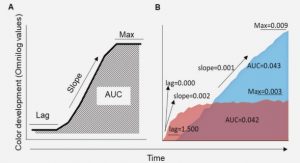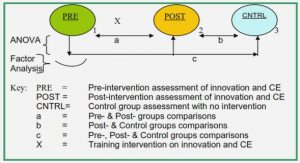Get Complete Project Material File(s) Now! »
Quality assessment
Doing the critical appraisals, the ethical aspects of each included study was scrutinised to make sure they complied to the core ethical principles [19-21]. The ethical aspects of all articles included in this literature review were considered as satisfactory due to all being peer-reviewed.
Appraisal checklists for systematic reviews, quantitative, qualitative and survey-based studies and with criteria upon which one answers yes/no/not evident were used to determine the quality of the articles [15-16], which were provided by Jönköping University (completed examples in appendix 2). Johansson et al [26] evaluated randomised controlled trials (RCTs) that received above 50% yes answers in the critical appraisal as high quality, based on van Tulder’s et al [27] guidelines. This was modified by calculating the yes answers rate of the different designs’ criteria and deeming 75% and above yes answers as high quality, while below 30% of yes answers as low quality. The Grading of Recommendations Assessment, Development and Evaluation (GRADE) guidelines as described by Swedish Agency for Health Technology Assessment and Assessment of Social Services [24] were used to determine the strength of the evidence. The strength of the evidence was graded from insufficient, low, moderate to strong evidence depending on the number of articles within each theme considered to be of a certain quality [24]. In practise, this meant that the number of articles of a certain quality within the themes were calculated. If, for example, most of the articles within a theme was of high quality, there was strong evidence for the assumption of that theme to be correct.
Data extraction
An overview of reviewed articles [15] was used as a tool when analysing the data, provided by Jönköping University (appendix 3). A critical interpretative synthesis [15] was used to analyse the data as this can be used on a broad range of research. The focus was on purposive sample, thus focusing on the literature found rather than worrying about having a comprehensive literature on the subject. It contains a reciprocal analysis which compares similarities in the literature but also a refutational analysis which means that differences in the literature was explored [15].
Each article was coded per its result which helped in creating and naming themes. The themes were compared for similarities and differences and consequently interpreted [15]. This process was done in an Excel spreadsheet where all the reviewed articles were compiled. The first coding consisted of identifying the words of ‘occupational therapy’ and variations of the word ‘cognition’ in the titles, article objectives and results. In practise, this meant the words were made bold in the spreadsheet. After looking at the similarities and differences of the articles, the second coding of the articles took place by naming the themes. The spreadsheet was then sorted according to the theme names. The similar aspect in all articles was occupational therapy in relation to a psychiatric diagnosis with a cognitive dysfunction. The differences between the articles were in fact creating the themes (examples in appendix 4).
Results
The review produced 20 articles in total of which 13 were high quality articles [28-40] and seven of medium quality [41-47]. Of the 13 high quality articles, six were RCTs or controlled trials (CT) [30,33-35,38-39], three were qualitative studies such as interviews and focus groups [31-32, 36], one survey-based study [29], one a systematic review [28], one a general overview and one a descriptive cross-sectional study [37]. Of the articles considered to be of a medium quality, two were systematic literature reviews [41, 47], and five studies of various quantitative designs [42-46].
The overall population was represented by eight regarding dementia clients [31,34-35,37,43-44,47], five articles of schizophrenia clients [30,33,38-39,46], three of general mental illness [28,41-42], two articles about psychosis clients [32,36], two of mild cognitive impairment (MCI) clients [29,45] and one article about depression clients [40]. All these are psychiatric diagnoses that manifest cognitive impairment among the symptoms [2, 5].
Three themes surfaced from the literature review: occupational therapy as a cognitive intervention, specifically named as cognitive interventions used by occupational therapists and multi-professional cognitive interventions including occupational therapy. The difference between the themes are that in the first theme the improvement of cognitive abilities was an outcome among others after occupational therapy interventions. In the second theme the occupational therapy interventions main objective was to improve the cognitive abilities of the clients. The third theme describes the multi-professional collaboration including occupational therapy, to improve the psychosocial participation of clients with the improvement of cognitive abilities as one outcome.
Occupational therapy as a cognitive intervention
The major theme to surface in this study at hand was that occupational therapy could be considered as a cognitive intervention. Twelve articles indicated that the cognitive functioning improved after the clients had received occupational therapy, as a part of other health benefits as an outcome of occupational therapy. Of these twelve articles, eight were of high quality [28-29,33-36,38-39] and four of medium quality [41, 44-46], which rendered for strong evidence Four of the articles showed that occupational therapy for schizophrenia clients improved the cognitive functioning, but that occupational therapy also was beneficiary for improving cognition in dementia cases (3), MCI cases (2), general mental illness (2) and in one study of psychosis clients.
Regarding schizophrenia clients, the occupational therapists used interventions that were chosen by the clients themselves and improved on scores of positive and negative symptoms and were functional in their nature with a long-lasting effect [46]. Shimada et al [38] found that individual occupational therapy combined with group occupational therapy improved on neurocognition such as verbal memory, working memory, verbal fluency, attention, and executive function in this population. In this study, the individual occupational therapy was tailored to the individual needs of the client. The clients chose which occupational therapy group to attend. The group options were those of physical fitness, handicraft, cooking, music appreciation, recreation and psycho-education. Tanaka et al [39] discovered that early occupational therapy for clients with acute schizophrenia improved on their functional independence and in the cognitive domain.
Occupational therapy showed to improve on cognition in dementia clients in three articles. The occupational therapy can take place in the community using cognitive and behavioural interventions and make use of cognitive aids [34]. In supporting improved quality of live-in dementia clients and incorporating cognitive training, the occupational therapist supports improved cognition [35]. Even though occupational therapy appears to improve on cognition in this population, the role of the occupational therapist is often the one of assessor. For example, in Ireland, the occupational therapists focused on assessments such as cognitive and functional performance screening, and lesser attention was paid to occupational participation In Canada however, cognitive concerns were addressed more frequently than functional concerns by occupational therapists in regards of dementia clients with MCI [29]. Occupational therapy programmes were effective for positive changes in both the cognitive and emotional states of dementia clients with MCI. The changes were maintained up to 3 months after the therapeutic sessions, possibly due to the improvement in self-awareness, knowledge and skills that the occupational therapy programmes offered [45].
Occupational therapy interventions with a focus on participation and performance in occupations related to paid and unpaid employment and education for people with serious mental illness showed to be effective in a systematic review [28]. The interventions combined with cognitive or social skills training included occupation/activity-based and addressed performance skills, aspects of the environment, activity demands, and client factors. There was limited but positive evidence for instrumental activities of daily living (IADL) interventions that targeted specific home-making occupations such as grocery-shopping and cooking [28]. The same themes were found in another systematic review that investigated the effectiveness of interventions within occupational therapy, focusing on the recovery model in regards of community integration and normative life roles for adults with serious mental illness. Occupation and activity-based interventions and interventions addressing performance skills and performance patterns, aspects of the environment, and context, activity demands, and client factors were included in this study. The evidence for the effectiveness of life skills and IADLs training to improve performance is moderate, as is the evidence for neurocognitive training paired with skills training in the areas of work, social participation, and IADLs [41]. Finally, engaging in highly valued activities when suffering from psychosis in early age rendered for six well-being enhancing experiences, the cognitive state being one: making meaning, expressing thoughts and emotions, changing physical, emotional and cognitive states, cultivating skills, strengths, and virtues, connecting and belonging and contributing [36].
Specifically named as cognitive interventions used by occupational therapists
Six articles were found where the occupational therapist had used an intervention which was specifically named as a cognitive intervention and which improved the cognitive functioning of the participants. This means that the occupational therapy interventions set out to improve specifically the cognitive abilities. Three articles were of high quality [30, 37, 40] and three of medium quality [42, 43,47]. Three of the studies were with dementia clients, one depression, one schizophrenia and one general mental illness.
The cognitive interventions used by occupational therapists have a wide range of potential in particular within dementia care. Law et al [43] hypothesised that functional task exercise programmes, with an exercise component incorporated into daily living tasks, may be beneficiary to elderly individuals with cognitive impairment due to dementia. A structured functional task exercise programme was developed to facilitate the cognitive functions of working memory and executive function to enhance the daily functional status of older persons with MCI. The results of the study showed that the programme had significant effects on general cognitive functions, memory, executive function, functional status and problem-solving ability of older adults with dementia.
Some occupational therapists incorporate and adapt cognitive interventions familiar from psychology and neuropsychology such as cognitive stimulation and cognitive training [37, 47]. Robert et al [37] aimed to establish a profile of occupational therapy practice for cognitive interventions for clients with Alzheimer’s disease (AD) in an urban setting. Findings indicated that 52.3% of occupational therapists performed cognitive interventions with persons with AD. Of those, 82.4% reported using cognitive rehabilitation, 61.8% used cognitive stimulation and 50.0% used cognitive training. Intervention use varied across settings and differed according to severity of AD. The sessions are usually provided individually and often include the client’s caregiver. Yuill and Hollis [47] recognised the need for effective non‐pharmacological approaches for individuals with mild to moderate dementia. As cognitive stimulation therapy (CST) interventions aimed to better cognitive functions, they explored the effectiveness of CST and the potential of this approach in occupational therapy. The CST interventions corresponded with many values that are important to occupational therapy, such as respect of individuality, recognition of capacity for self‐determination, encouragement of participation in meaningful activities and optimisation of overall well‐being. The CST programmes also contained therapeutic goals and outcomes relevant to occupational therapy.
Other interventions within psychiatry and mental health named to be cognitive by occupational therapists and that have improved on cognition in terms of processing speed, memory and executive function are: an aerobic dance programme, life skills intervention such as food and money management and safe community participation and cognitive work hardening at the workplace [30, 42, 40]. Chen et al [30] found that an aerobic dance programme designed to better the cognitive functions of clients with schizophrenia, significantly improved on processing speed, memory and executive function. The dance programme used movements from everyday activities in a repetitive way that supported the recalling process. Helfrich et al found that clients with mental illness and who had been homeless were likely to have cognitive limitations, but that the functional impact of those limitations on life skills had not been explored. Life skills such as food management, self-care, community participation, money management and cleaning were taught to previously homeless persons and although participants with lower cognitive levels did not perform as well as those with higher cognitive levels, both groups showed improvement in life skills over time. Wisenthal and Krupa [40] presented in their paper the concept of cognitive work hardening for return to work for occupational therapy clients with depression. Characteristic for this cognitive occupational therapy intervention is a client-centred approach which is collaborative and consultative with the client. Cognitive work hardening supports goal attainment and successful return-to-work preparation for people with depression. It focuses on the workplace and the skills required by the client to succeed at work and thus bridges the gap from healthcare to the workplace to an eventual benefit for both clients and employers.
Multi-professional cognitive interventions including occupational therapy
Two high quality articles, thus indicating strong evidence, evaluated multi-professional (including occupational therapy) programmes’ efficacy in regards of psycho-social interventions [31-32]. One programme consisted of a tailor-made collaboration of occupational therapists, physiotherapists and welfare professionals for guidance of the clients to improve social participation of people with cognitive impairments. This programme was called the Social Fitness Programme31. The other study’s objective was to evaluate whether the TIME-programme in the United Kingdom met the needs of the young psychosis clients and to investigate the process of applying this kind of multi-professional collaborative service based on the perspective of the service providers. The programme combined such psychosocial therapies as early intervention, family intervention, cognitive therapy and cognitive-behavioural therapy, and occupational therapy [32].
These programmes showed a mild improved cognitive functioning in dementia and psychosis clients and were appreciated by the clients, but the programmes had certain obstacles. Both studies showed barriers such as shared decision making or discrepancies between values and principles between health-care professionals or between those executing the policies and the policy-makers [31-32]. The Social Fitness Programme had difficulties recruiting participants as individuals with cognitive impairments were not motivated to improve on their social participation [31].
Discussion
This literature review aimed to identify within the literature how occupational therapists work with cognitive interventions in psychiatry and mental health internationally. Essentially, the major part of the articles in this review indicate that occupational therapy can be considered a cognitive intervention and that it appears to improve cognition in a broad range of psychiatric diagnoses. The reason for this could be that, as earlier mentioned, different cognitive processes need to work in the human brain to perform everyday occupations. These processes are important for interaction with other humans and the environment, for decision-making and for performance of meaningful actions and are needed in any human occupation and thus important in occupational therapy [1-2, 5]. The occupational therapy interventions used in the different studies were all everyday occupations: grocery-shopping, cooking, activities chosen by the client, combined group and individual occupational therapy, cognitive and behavioural interventions with cognitive exercise to improve quality of life, assessments on cognitive and functional performance, occupational therapy programmes that improved self-awareness, knowledge and skills, occupation/activity-based and addressed performance skills, aspects of the environment, activity demands, and client factors. The studies also indicated that occupational therapy supports a return to mental health in many domains of life, i.e. social interaction and that improved cognition is only one part of the whole picture. These findings are consistent with results from studies in the fields of psychology and neuropsychology of repetitive neuro-cognitive drill and practise training and social skills training that consider the individual goals of the client as being beneficial in improving cognition [8,13-14]. The connection between occupational therapy and improved cognition in a broad range of psychiatric diagnoses needs to be a subject for future research. The implications for occupational therapy practise within the field of psychiatry and mental health would be significant as cognition is currently the dominant view of understanding within psychology [2, 5]. Occupational therapy could become an essential part of the treatment of clients with psychiatric diagnoses.
Surprisingly few articles were found regarding occupational therapy interventions that are cognitive, i.e. they set out to improve cognitive abilities through occupational therapy interventions. Most of the articles examined cognitive interventions in relation to dementia clients such as functional task exercise programmes, cognitive rehabilitation, cognitive stimulation and cognitive training. Examples of specifically named as cognitive interventions used by occupational therapists were aerobic dance programme for schizophrenia clients, life skills training for clients with general mental illness and cognitive work hardening for depression. The overall notion in these studies is the repetitive and functional nature of the cognitive interventions, which is consistent with the studies from the fields of psychology and neuropsychology [8, 13-14]. One reason to the limited number of articles addressing specifically named cognitive interventions within occupational therapy is perhaps the nature of occupational therapy as a holistic treatment of issues in everyday lives of the clients than just the one domain such as the cognitive one.
Two high quality articles [31-32] were identified where occupational therapy was part of a multi-professional team that improved on among others cognitive impairment in dementia and psychosis clients. These articles described the programmes while also evaluating their feasibility and considered why these programmes were not working as intended. These articles give ideas for practise in co-operation with other professions but are too few to draw any conclusions from at this stage. This theme would, however, be a subject for a future study in relation to improved cognition for clients in the field of psychiatry and mental health.
GET THE COMPLETE PROJECT
How Do Occupational Therapists Work with Cognitive Interventions in Psychiatry and Mental Health? A Systematic Literature Review






